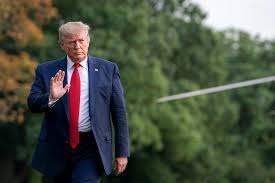Trump Firing Fed Governor Cook: Unpacking the Legal and Executive Ramifications
The abrupt dismissal of Federal Reserve Governor Philip Jefferson by former President Donald Trump continues to reverberate through U.S. political circles. This controversial move, unprecedented in recent history, raises significant questions about the delicate balance of power between the executive and independent branches of government. This in-depth analysis explores the legal underpinnings, executive authority, and political fallout of this high-stakes decision.
Understanding the Context: Presidential Power vs. Fed Independence
The Federal Reserve System, often referred to as the Fed, is an independent central bank tasked with maintaining the stability of the U.S. financial system. Its governors, appointed by the President and confirmed by the Senate, serve staggered 14-year terms, designed to insulate them from short-term political pressures. This independence is crucial for the Fed’s ability to make objective decisions regarding monetary policy, interest rates, and inflation control, without undue influence from the executive branch. Trump’s action directly challenged this established principle.
The Legal Arguments: Examining the Authority to Remove a Fed Governor
The legal basis for removing a Fed governor is not explicitly defined in the Federal Reserve Act. This ambiguity has led to considerable debate and speculation regarding the legality of Trump’s actions. While the President has the power to appoint governors, some legal scholars argue that the removal process should be subject to specific conditions, potentially requiring a showing of cause or misconduct. Others contend that the President has inherent authority to dismiss appointees, especially if they are perceived as obstructing the administration’s economic agenda. The lack of clear legal precedent adds to the complexity of the situation.
Executive Overreach or Necessary Action? Weighing the Political Implications
The political ramifications of Trump’s decision are far-reaching. Critics argue that the move represents a dangerous precedent, undermining the independence of the Fed and potentially jeopardizing the stability of the U.S. economy. They contend that such actions could lead to politicization of monetary policy, eroding public trust in the Fed’s ability to act impartially. Conversely, supporters might argue that the President has a right to remove appointees who are deemed ineffective or obstructive, particularly in critical economic times. This perspective highlights the tension between executive authority and the need for independent institutions.
The Precedent and Future Consequences: A Shifting Landscape
The Trump administration’s actions set a potentially unsettling precedent. Future presidents may be emboldened to intervene more directly in the affairs of independent agencies, potentially undermining their effectiveness and impartiality. This raises concerns about the long-term health of democratic institutions and the rule of law. The potential for increased political influence on economic policy could also lead to unpredictable economic outcomes, impacting markets and investor confidence. The lack of clear legal guidance regarding the removal of Fed governors leaves the door open for future challenges and conflicts.
Analyzing the Public Reaction: Media Coverage and Public Opinion
The dismissal of Governor Cook sparked intense media scrutiny and public debate. News outlets across the political spectrum offered varying interpretations of the event, highlighting the deep divisions surrounding the issue. Public opinion polls revealed a wide range of views, reflecting the complex and often contradictory nature of the arguments. Understanding the public’s perception is crucial to grasping the full impact of this controversial decision.
Comparing with Historical Precedents: Learning from the Past
While the removal of a Fed governor by a sitting president is relatively rare, it’s not unprecedented. Examining past instances of executive actions against independent agencies can offer valuable insights into the potential consequences and long-term implications of Trump’s decision. Analyzing similar events helps to establish a historical context for the current debate, providing a more nuanced understanding of the legal and political dynamics at play.
The Role of Congress: Oversight and Potential Responses
Congress plays a vital role in overseeing the actions of the executive branch. The dismissal of Governor Cook could trigger congressional investigations and hearings, potentially leading to legislative action to clarify the legal framework governing the removal of Fed governors. The congressional response will be crucial in shaping the future of the Fed’s independence and the balance of power between the executive and independent branches of government.
Conclusion: Implications for the Future of the Fed and U.S. Politics
The Trump administration’s decision to dismiss Federal Reserve Governor Cook marks a significant event in U.S. political and economic history. The lack of clear legal precedent, coupled with the intense political ramifications, underscores the need for a thorough examination of executive authority and the independence of vital institutions. The long-term consequences of this action remain to be seen, but it is clear that the debate surrounding presidential power, the Fed’s autonomy, and the balance of power within the U.S. government will continue for years to come. It is crucial to stay informed and engaged in this critical discussion to protect the integrity of our democratic institutions.
Call to Action: What are your thoughts on the Trump administration’s firing of Fed Governor Cook? Share your perspective in the comments below!

